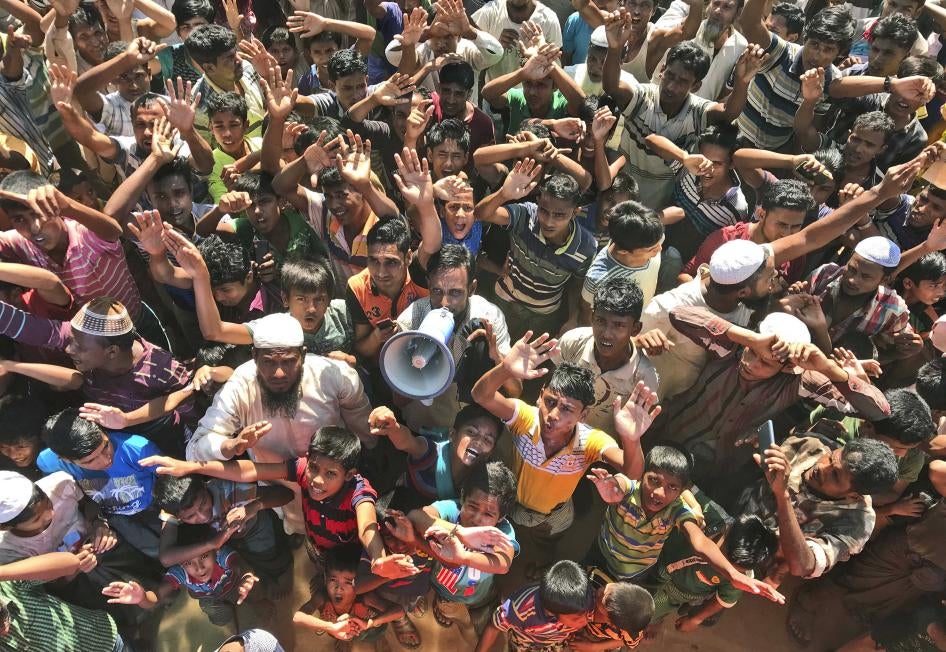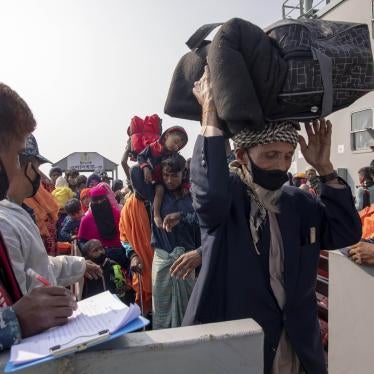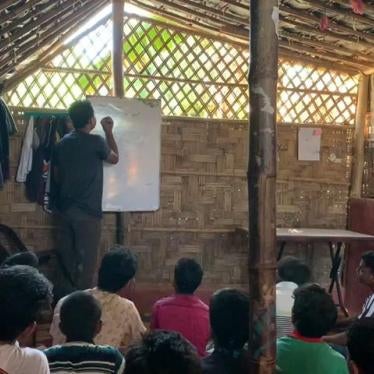(Bangkok) – Bangladesh authorities should suspend plans to send Rohingya refugees back to Myanmar, where their lives and liberty would be at grave risk, Human Rights Watch said today.
Rohingya told Human Rights Watch that they were lied to, deceived, or otherwise coerced by Bangladesh administrators into meeting with a recent delegation of Myanmar junta officials as part of a “pilot repatriation” effort to return about 1,000 refugees. Some were told the meetings concerned possible resettlement to a third country.
“Voluntary, safe, and dignified returns of Rohingya refugees to Myanmar are not possible while the military junta is carrying out massacres around the country and apartheid in Rakhine State,” said Meenakshi Ganguly, South Asia director at Human Rights Watch. “Bangladesh authorities should stop deceiving these refugees to get them to engage with junta officials when it’s clear that Rohingya will only be able to return safely when rights-respecting rule is established.”
Conditions in Myanmar’s Rakhine State have not been conducive to voluntary, safe, or dignified returns of Rohingya refugees since 2017, when more than 730,000 Rohingya fled the Myanmar military’s crimes against humanity and acts of genocide. The prospect of durable returns has grown ever more distant since the February 2021 military coup in Myanmar, carried out by the same generals who orchestrated the 2017 mass atrocities.
Bangladesh has appropriately not compelled these refugees to return and should continue that policy with the support of international donors, Human Rights Watch said.
A delegation of 17 Myanmar junta officials visited the Cox’s Bazar camps in Bangladesh, which house about one million Rohingya refugees, from March 15-22, 2023. The officials interviewed 449 Rohingya from 149 families in the Teknaf camps for “verification” for the pilot repatriation process, media reported. A junta official told Agence France-Presse that the pilot program could start as early as mid-April.
Human Rights Watch spoke with 15 Rohingya about their verification interviews. Not one said that they had been informed in advance that they would be meeting with junta officials about being returned to Myanmar. All 15 said they had been interviewed several times by Bangladesh authorities over the past two years, but had never been told that their names were listed for possible return.
“I wasn’t informed that I would be interviewed by the Myanmar delegation,” said a Rohingya man interviewed by junta officials on March 15 along with 10 family members. “I was called beforehand by the camp-in-charge [CiC, a Bangladesh official], who told me to be present on the interview date at my shelter. When I asked why, he said I would be interviewed for the opportunity to go abroad for resettlement. I never realized it was a Myanmar delegation I was going to meet, or that it was about repatriation.”
He said that the CiC had threatened him: “He said that if we weren’t present for the interview, we’d be forced by the police to appear. So, I doubted that it was about resettlement options, and worried it was about repatriation instead.”
A majhi (Rohingya community leader) who was interviewed by the delegation on March 21 said that he was also not informed about the reason for the interview or those that preceded it, and was similarly threatened by Bangladeshi officials with police intervention when he resisted.
“Even as majhis, we were not told why we were being called several times by the CiC office to give family information,” he said. “They gave us false hope that a group was coming to meet us for an opportunity to resettle. From my block, my family and another family’s names appeared on the list. When we found out that it was the Myanmar delegation we had to meet, we tried to oppose it, but the authorities here threatened us. Some families from other camps fled their shelters fearing they’d be forced to return.”
Two prior repatriation attempts undertaken in November 2018 and August 2019 failed, with Rohingya refugees unwilling to return due to the ongoing persecution and abuse in Myanmar. In January 2022, the Bangladesh government and Myanmar junta renewed discussions around repatriation, announcing joint plans to “expeditiously complete the verification process.” While Bangladesh’s Foreign Minister A.K. Abdul has declared that “early repatriation” is a top priority, he told BenarNews in March 2023 that Bangladesh would not force refugees to return to Myanmar.
Bangladesh officials reported that the 449 Rohingya were interviewed to verify their identities and places of origin, joining a list of over 700 refugees already confirmed for the pilot repatriation.
A Rohingya woman interviewed on March 15 with her newborn baby and six other family members said, “They were asking for family information and where we lived when we were in Rakhine. They filled up about four to five pages of documents. We weren’t shown what was written on them. Then they took our thumbprints.” Rohingya interviewed on the first day were required to provide thumbprints, which was reportedly stopped after community leaders raised concerns with the Bangladesh authorities.
About 600,000 Rohingya remain in Rakhine State under the junta’s oppressive rule, facing systematic abuses that amount to the crimes against humanity of apartheid, persecution, and deprivation of liberty. The junta has imposed new movement restrictions and aid blockages on Rohingya camps and villages, increasing water scarcity and food shortages, along with disease and malnutrition. Since the 2021 coup, security forces have arrested thousands of Rohingya men, women, and children for “unauthorized travel.”
The refugees said that the junta officials asked them about their relatives in Rakhine State. “My family members who are still in Rakhine live in fear of persecution by the military or insurgent groups,” a Rohingya man interviewed by the delegation on March 16 said. “Now, if they end up in trouble because of me, who will protect them?”
Rohingya refugees have consistently said that they want to go home, but only when their security, access to land and livelihoods, freedom of movement, and citizenship rights can be ensured.
The refugees said the delegation refused to answer any questions about whether their land would be returned or if they would be granted citizenship and other rights and freedoms. “If they really wanted to take us back, they wouldn’t hesitate to answer any of our questions and ensure our rights,” said another camp majhi interviewed by the delegation. “They only want to take us back to Rakhine because they’re under pressure. We know they won’t let us go back to our land, they’ll put us in that camp settlement forever. We’ll only go back when they publicly commit to giving us the same rights as citizens in Myanmar and getting our land and properties back.”
In early March, junta officials took several diplomats to Rakhine State’s Maungdaw township to visit the Nga Khu Ya reception center and Hla Poe Kaung transit camp. The camps, built on Rohingya land in 2018 to process and house returnees, are surrounded by barbed-wire perimeter fences and security outposts.
Junta officials have also been visiting Rakhine in preparation for their submission to the International Court of Justice, due by April 24, in the Genocide Convention case brought by Gambia. Activists and refugees allege that the pilot repatriation project is part of broader junta efforts to feign progress in its treatment of the Rohingya to the court.
The United Nations refugee agency, UNHCR, provided unmarked UN boats to transport the junta delegation to Cox’s Bazar. In response to criticism, UNHCR said that while it is not involved in the pilot repatriation discussions, it “supports efforts that could lead to the verification of all refugees and pave the way for eventual return,” which in this case included “providing logistical support to members of the Myanmar delegation to cross into Bangladesh for the technical verification process.” UNHCR did assert that “conditions in Myanmar’s Rakhine State are currently not conducive to the sustainable return of Rohingya refugees.”
Fully informed and voluntary returns depend, among other key factors, on providing refugees with objective and accurate information about conditions in areas of origin. UNHCR should not be providing logistical support to officials operating under the same military leaders who oversaw the grave crimes the Rohingya fled, in service of a repatriation plan that contravenes international standards, Human Rights Watch said.
Since 2017, the Bangladesh government has respected the international principle of nonrefoulement, the right of refugees not to be returned to a country where their lives or freedom would be threatened. But Bangladesh authorities have also been intensifying restrictions on livelihoods, movement, and education that compound refugees’ vulnerability and dependence on aid and appear designed to coerce refugees into considering returning to Myanmar. Bangladesh should formalize and expand education and employment opportunities to bolster Rohingya’s self-reliance for their eventual return or resettlement.
“For future returns to be truly voluntary, the Bangladesh authorities need to allow Rohingya to live freely, without enforcing pressures pushing them to go back,” Ganguly said. “Donors should increase support for a more sustainable life for Rohingya today, which will help them develop the skills and independence needed for the day when safe returns are possible.”









